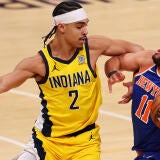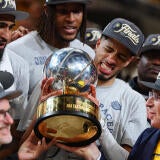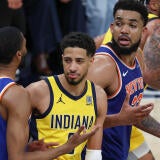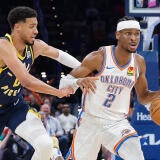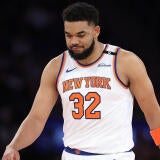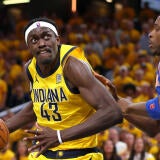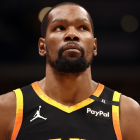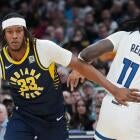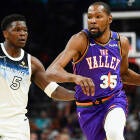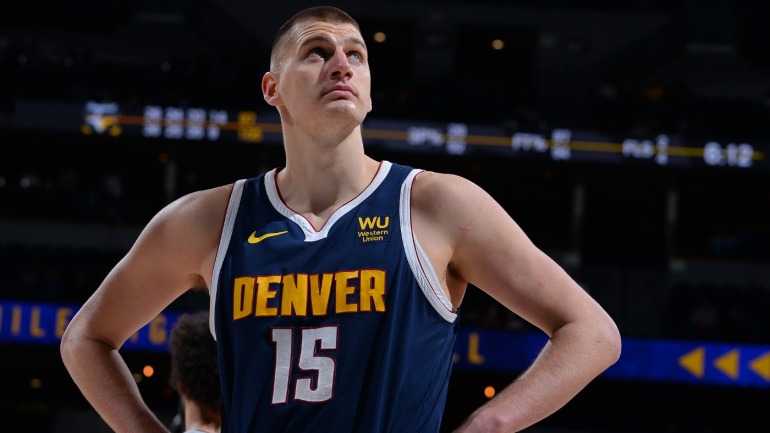
In 2014, Taco Bell made a big bet on the staying power of the quesarito. They can hardly be blamed for that. Who wouldn't love a burrito wrapped in a cheesy blanket? Nobody, Taco Bell assumed. They just had to get the word out. So they bought valuable advertising space during the NBA Draft to promote their latest concoction.
The event's producers apparently bought into the hype and decided to air Taco Bell's commercial while picks were being made. After all, second-round picks rarely amount to anything in the NBA. So as America bowed to its new culinary overlord, the Denver Nuggets selected some kid from Serbia the scouts said might turn out to be a decent passer.
Nikola Jokic was picked 41st...
— The Association (@association) June 8, 2021
during a Taco Bell commercial.
Now, he’s the MVP 🏆pic.twitter.com/NueEkIjQKT
The quesarito was removed from Taco Bell menus in 2020. It was too beautiful for this world. Oh, and that Serbian kid? He was just named the 2021 NBA MVP.
Nothing could better encapsulate the sheer unlikelihood of Nikola Jokic's ascension than the burrito that upstaged him. The NBA had so little faith in him that it sold the moment that launched his career to a fast-food item that no longer exists. In fairness to the league, its skepticism was warranted.
Prior to Tuesday, the lowest-drafted MVPs in NBA history were Steve Nash and Giannis Antetokounmpo. They both went No. 15 overall. Jokic fell another 26 slots to No. 41. He was the second second-round pick ever to win the MVP. The first was Willis Reed in 1970. When he was drafted in 1964, the league had seven teams. He was picked No. 8. Jokic is just the third European MVP after Antetokounmpo and Dirk Nowitzki. Only 24 other Serbian-born players had ever reached the NBA when Jokic debuted in 2015. In his second season, Jokic famously asked Nuggets coach Michael Malone to let him come off of the bench. How many other MVPs can say that?
These are unprecedented circumstances in a league in which stardom is often preordained. Every MVP prior to Reed's win in 1970 was a top-three pick or a territorial draft pick. The NBA has given out 65 MVP awards, and only 18 went to players taken outside of the top five. Many of those were due to extenuating circumstances. Julius Erving was picked No. 12 because he was already playing in the ABA. Larry Bird went No. 7 because he was planning to return to school. Players like Jokic appearing out of nowhere and winning the MVP award just doesn't happen.
Does that make Jokic the most surprising MVP in NBA history? It depends on the lens through which you view the question. Technically, Moses Malone was never drafted by an NBA team. He became the first basketball player in modern history to turn professional coming out of high school, and at the time, the NBA did not allow players to do so. The ABA was more open-minded, but it didn't exactly view Malone as a sure thing. He was drafted in the third round by the Utah Stars and only reached the NBA through the ABA's dispersal draft.
But the traditional path was available to Malone. He almost attended the University of Maryland, and had he done so, he likely would have dominated college basketball and eventually become a top pick like most other MVPs. There is little evidence suggesting that Jokic was heavily recruited by American colleges, though, and it was an option that he was surely aware of. His brother Nemanja played for the University of Detroit Mercy.
College recruiters are far from infallible, though. They've missed plenty of future stars. Stephen Curry wanted to play for Virginia Tech like his father, Dell, but they wouldn't offer him a scholarship. Rather than play as a walk-on, Curry grew into a legend at Davidson. Colleges can at least feign ignorance with Jokic. Curry slipped right under their noses.
Most of the NBA missed on Nash even in his prime. When he signed a five-year, $65 million deal with the Phoenix Suns in 2004, his former team turned around and spent $73 million on Erick Dampier, who had never averaged more than 12.3 points per game. At that point, the league viewed the two of them as roughly analogous, non-MVP-caliber players. In that sense, Nash's development may have been less likely than Jokic's in the moment. Jokic entered the 2020-21 season as a proven superstar with roughly 30-to-1 MVP odds. Nash might have been available at 300-to-1 before his 2004 victory.
But hindsight is once again 20-20. The Suns signed Nash expecting the leap he ultimately made because the NBA had only just outlawed hand-checking. That made smaller guards like Nash significantly more valuable as it offered far more freedom of movement for them. No rule changes had similar effects on Jokic. The NBA has been making it harder for players to score in the post for decades.
A startling number of MVPs made the transition to basketball only after careers in other sports didn't pan out. Tim Duncan was a swimmer before Hurricane Hugo destroyed his local pool. Dirk Nowitzki played tennis growing up. Hakeem Olajuwon played soccer. But at their sizes, they were inevitably going to find basketball eventually. The skills they developed in other sports turned into unique weapons. Olajuwon's footwork tortured defenders for almost two decades. Few players have ever matched Nowitzki's balance.
The common thread among all of those players is that the professional basketball world almost certainly viewed each of them as more valuable than a cheese-covered burrito. Jokic is the lone exception, and until another MVP knows what it means to have their thunder stolen by a literal flavor of the month, we can safely call him the unlikeliest MVP in NBA history.
![[object Object] Logo](https://sportshub.cbsistatic.com/i/2020/04/22/e9ceb731-8b3f-4c60-98fe-090ab66a2997/screen-shot-2020-04-22-at-11-04-56-am.png)



